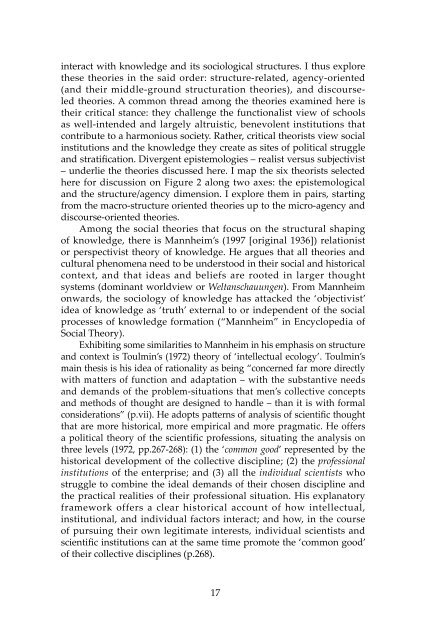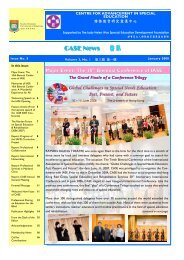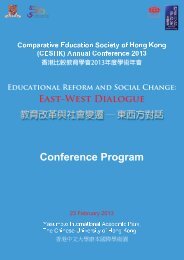Comparative Education Bulletin - Faculty of Education - The ...
Comparative Education Bulletin - Faculty of Education - The ...
Comparative Education Bulletin - Faculty of Education - The ...
You also want an ePaper? Increase the reach of your titles
YUMPU automatically turns print PDFs into web optimized ePapers that Google loves.
interact with knowledge and its sociological structures. I thus explore<br />
these theories in the said order: structure-related, agency-oriented<br />
(and their middle-ground structuration theories), and discourseled<br />
theories. A common thread among the theories examined here is<br />
their critical stance: they challenge the functionalist view <strong>of</strong> schools<br />
as well-intended and largely altruistic, benevolent institutions that<br />
contribute to a harmonious society. Rather, critical theorists view social<br />
institutions and the knowledge they create as sites <strong>of</strong> political struggle<br />
and stratification. Divergent epistemologies – realist versus subjectivist<br />
– underlie the theories discussed here. I map the six theorists selected<br />
here for discussion on Figure 2 along two axes: the epistemological<br />
and the structure/agency dimension. I explore them in pairs, starting<br />
from the macro-structure oriented theories up to the micro-agency and<br />
discourse-oriented theories.<br />
Among the social theories that focus on the structural shaping<br />
<strong>of</strong> knowledge, there is Mannheim’s (1997 [original 1936]) relationist<br />
or perspectivist theory <strong>of</strong> knowledge. He argues that all theories and<br />
cultural phenomena need to be understood in their social and historical<br />
context, and that ideas and beliefs are rooted in larger thought<br />
systems (dominant worldview or Weltanschauungen). From Mannheim<br />
onwards, the sociology <strong>of</strong> knowledge has attacked the ‘objectivist’<br />
idea <strong>of</strong> knowledge as ‘truth’ external to or independent <strong>of</strong> the social<br />
processes <strong>of</strong> knowledge formation (“Mannheim” in Encyclopedia <strong>of</strong><br />
Social <strong>The</strong>ory).<br />
Exhibiting some similarities to Mannheim in his emphasis on structure<br />
and context is Toulmin’s (1972) theory <strong>of</strong> ‘intellectual ecology’. Toulmin’s<br />
main thesis is his idea <strong>of</strong> rationality as being “concerned far more directly<br />
with matters <strong>of</strong> function and adaptation – with the substantive needs<br />
and demands <strong>of</strong> the problem-situations that men’s collective concepts<br />
and methods <strong>of</strong> thought are designed to handle – than it is with formal<br />
considerations” (p.vii). He adopts patterns <strong>of</strong> analysis <strong>of</strong> scientific thought<br />
that are more historical, more empirical and more pragmatic. He <strong>of</strong>fers<br />
a political theory <strong>of</strong> the scientific pr<strong>of</strong>essions, situating the analysis on<br />
three levels (1972, pp.267-268): (1) the ‘common good’ represented by the<br />
historical development <strong>of</strong> the collective discipline; (2) the pr<strong>of</strong>essional<br />
institutions <strong>of</strong> the enterprise; and (3) all the individual scientists who<br />
struggle to combine the ideal demands <strong>of</strong> their chosen discipline and<br />
the practical realities <strong>of</strong> their pr<strong>of</strong>essional situation. His explanatory<br />
framework <strong>of</strong>fers a clear historical account <strong>of</strong> how intellectual,<br />
institutional, and individual factors interact; and how, in the course<br />
<strong>of</strong> pursuing their own legitimate interests, individual scientists and<br />
scientific institutions can at the same time promote the ‘common good’<br />
<strong>of</strong> their collective disciplines (p.268).<br />
17
















